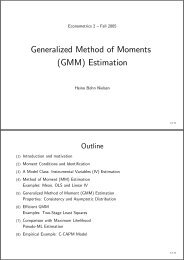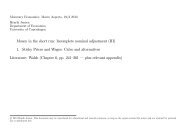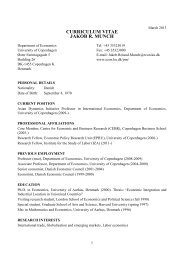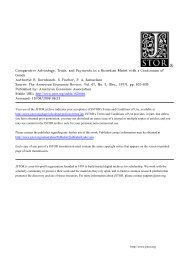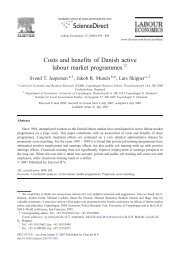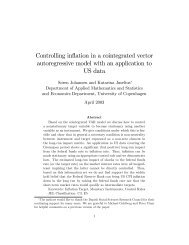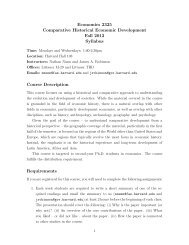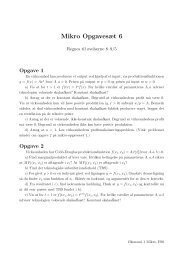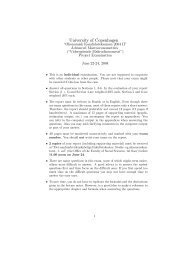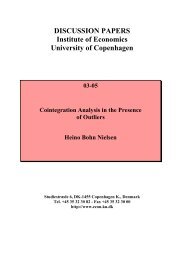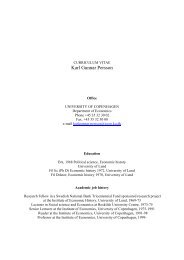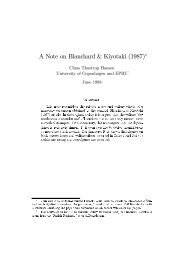- Page 1 and 2:
Nationaløkonomisk Tidsskrift 143 (
- Page 3 and 4:
OM LÆREPLADSSPØRGSMÅLET 3 serier
- Page 5 and 6:
OM LÆREPLADSSPØRGSMÅLET 5 90000
- Page 7 and 8:
OM LÆREPLADSSPØRGSMÅLET 7 0,60 0
- Page 9 and 10:
OM LÆREPLADSSPØRGSMÅLET 9 givet
- Page 11 and 12:
OM LÆREPLADSSPØRGSMÅLET 11 over
- Page 13 and 14:
OM LÆREPLADSSPØRGSMÅLET 13 angiv
- Page 15 and 16:
OM LÆREPLADSSPØRGSMÅLET 15 Dette
- Page 17 and 18:
OM LÆREPLADSSPØRGSMÅLET 17 Tabel
- Page 19 and 20:
OM LÆREPLADSSPØRGSMÅLET 19 hverv
- Page 21 and 22:
OM LÆREPLADSSPØRGSMÅLET 21 Ikke
- Page 23 and 24:
OM LÆREPLADSSPØRGSMÅLET 23 didat
- Page 25 and 26:
OM LÆREPLADSSPØRGSMÅLET 25 Litte
- Page 27 and 28:
MILJØMODELLER TIL ADAM 27 ling i D
- Page 29 and 30:
MILJØMODELLER TIL ADAM 29 Tekniske
- Page 31 and 32:
MILJØMODELLER TIL ADAM 31 LADA kan
- Page 33 and 34:
MILJØMODELLER TIL ADAM 33 NH 3 54%
- Page 35 and 36:
MILJØMODELLER TIL ADAM 35 Tabel 4.
- Page 37 and 38:
MILJØMODELLER TIL ADAM 37 8%). End
- Page 39 and 40:
MILJØMODELLER TIL ADAM 39 portsyst
- Page 41 and 42:
MILJØMODELLER TIL ADAM 41 Konkurre
- Page 43 and 44:
Nationaløkonomisk Tidsskrift 143 (
- Page 45 and 46:
BØR VIRKSOMHEDER OPLYSES OM SANDSY
- Page 47 and 48:
BØR VIRKSOMHEDER OPLYSES OM SANDSY
- Page 49 and 50:
BØR VIRKSOMHEDER OPLYSES OM SANDSY
- Page 51 and 52:
BØR VIRKSOMHEDER OPLYSES OM SANDSY
- Page 53 and 54:
BØR VIRKSOMHEDER OPLYSES OM SANDSY
- Page 55 and 56:
BØR VIRKSOMHEDER OPLYSES OM SANDSY
- Page 57 and 58:
BØR VIRKSOMHEDER OPLYSES OM SANDSY
- Page 59 and 60:
BØR VIRKSOMHEDER OPLYSES OM SANDSY
- Page 61 and 62:
BØR VIRKSOMHEDER OPLYSES OM SANDSY
- Page 63 and 64:
BØR VIRKSOMHEDER OPLYSES OM SANDSY
- Page 65 and 66:
Nationaløkonomisk Tidsskrift 143 (
- Page 67 and 68:
THE CONSUMPTION OF ALCOHOL IN THE S
- Page 69 and 70:
THE CONSUMPTION OF ALCOHOL IN THE S
- Page 71 and 72:
THE CONSUMPTION OF ALCOHOL IN THE S
- Page 73 and 74:
THE CONSUMPTION OF ALCOHOL IN THE S
- Page 75 and 76:
THE CONSUMPTION OF ALCOHOL IN THE S
- Page 77 and 78:
THE CONSUMPTION OF ALCOHOL IN THE S
- Page 79 and 80:
THE CONSUMPTION OF ALCOHOL IN THE S
- Page 81 and 82:
Nationaløkonomisk Tidsskrift 143 (
- Page 83 and 84:
THE EFFECT OF LABOUR MARKET CONDITI
- Page 85 and 86:
THE EFFECT OF LABOUR MARKET CONDITI
- Page 87 and 88:
THE EFFECT OF LABOUR MARKET CONDITI
- Page 89 and 90:
THE EFFECT OF LABOUR MARKET CONDITI
- Page 91 and 92:
THE EFFECT OF LABOUR MARKET CONDITI
- Page 93 and 94:
THE EFFECT OF LABOUR MARKET CONDITI
- Page 95 and 96:
THE EFFECT OF LABOUR MARKET CONDITI
- Page 97 and 98:
THE EFFECT OF LABOUR MARKET CONDITI
- Page 99 and 100:
THE EFFECT OF LABOUR MARKET CONDITI
- Page 101 and 102:
THE EFFECT OF LABOUR MARKET CONDITI
- Page 103 and 104:
THE EFFECT OF LABOUR MARKET CONDITI
- Page 105 and 106:
DEBAT OG KOMMENTARER 105 det astron
- Page 107 and 108:
DEBAT OG KOMMENTARER 107 gælder ik
- Page 109 and 110:
DEBAT OG KOMMENTARER 109 prisstivhe
- Page 111 and 112:
DEBAT OG KOMMENTARER 111 keynesiane
- Page 113 and 114:
DEBAT OG KOMMENTARER 113 outside in
- Page 115 and 116:
DEBAT OG KOMMENTARER 115 Begrebet '
- Page 117 and 118:
DEBAT OG KOMMENTARER 117 men ikke k
- Page 119 and 120:
DEBAT OG KOMMENTARER 119 som et ana
- Page 121 and 122:
DEBAT OG KOMMENTARER 121 Appendiks:
- Page 123:
BOGANMELDELSER 123 J. A. Schumpeter
- Page 126 and 127:
126 NATIONALØKONOMISK TIDSSKRIFT 2
- Page 128 and 129:
128 NATIONALØKONOMISK TIDSSKRIFT 2
- Page 130 and 131:
130 NATIONALØKONOMISK TIDSSKRIFT 2
- Page 132 and 133:
132 Det fremgår, at minimering af
- Page 134 and 135: 134 NATIONALØKONOMISK TIDSSKRIFT 2
- Page 136 and 137: 136 3 2 1 0 -1 -2 -3 -4 1986 1988 1
- Page 138 and 139: 138 Ymax Fmax Flag NATIONALØKONOMI
- Page 140 and 141: 140 NATIONALØKONOMISK TIDSSKRIFT 2
- Page 142 and 143: 142 1,50 1,25 1,00 0,75 0,50 0,25 N
- Page 144 and 145: 144 NATIONALØKONOMISK TIDSSKRIFT 2
- Page 146 and 147: 146 3 2 1 0 -1 -2 -3 -4 Filtrerede
- Page 148 and 149: 148 NATIONALØKONOMISK TIDSSKRIFT 2
- Page 150 and 151: 150 Dahl, C., H. Hansen og J. Smidt
- Page 152 and 153: 152 Autoregressiv model. (Ymax = 4)
- Page 154 and 155: 154 25 20 15 10 5 Official discount
- Page 156 and 157: 156 NATIONALØKONOMISK TIDSSKRIFT 2
- Page 158 and 159: 158 NATIONALØKONOMISK TIDSSKRIFT 2
- Page 160 and 161: 160 25 20 15 10 5 0 -5 Figure 3. Re
- Page 162 and 163: 162 ry of monetary regimes - some l
- Page 164 and 165: 164 Table A.1. Danish interest rate
- Page 166 and 167: 166 continued ... NATIONALØKONOMIS
- Page 168 and 169: Nationaløkonomisk Tidsskrift 143 (
- Page 170 and 171: 170 NATIONALØKONOMISK TIDSSKRIFT 2
- Page 172 and 173: 172 Average UIB rate pr. year 100 9
- Page 174 and 175: 174 NATIONALØKONOMISK TIDSSKRIFT 2
- Page 176 and 177: 176 NATIONALØKONOMISK TIDSSKRIFT 2
- Page 178 and 179: 178 NATIONALØKONOMISK TIDSSKRIFT 2
- Page 180 and 181: 180 Per cent 40 35 30 25 20 15 10 5
- Page 182 and 183: 182 Table 2. Trend adjusted differe
- Page 186 and 187: 186 den, Finland, Austria, Germany,
- Page 188 and 189: 188 continued ... NATIONALØKONOMIS
- Page 190 and 191: 190 1.000 kr 150 100 50 0 -50 -100
- Page 192 and 193: 192 NATIONALØKONOMISK TIDSSKRIFT 2
- Page 194 and 195: 194 NATIONALØKONOMISK TIDSSKRIFT 2
- Page 196 and 197: 196 Forsørgerkvote 150 140 130 120
- Page 198 and 199: 198 NATIONALØKONOMISK TIDSSKRIFT 2
- Page 200 and 201: 200 NATIONALØKONOMISK TIDSSKRIFT 2
- Page 202 and 203: 202 Timer 2200 2000 1800 1600 1400
- Page 204 and 205: 204 Pct. af BNP 5 0 2001 2011 2021
- Page 206 and 207: 206 Pct. 18 16 14 12 10 8 6 4 2 0 2
- Page 208 and 209: 208 NATIONALØKONOMISK TIDSSKRIFT 2
- Page 210 and 211: 210 Procent af BNP 8 4 0 2001 2021
- Page 212 and 213: 212 Pct. 18 16 14 12 10 8 6 4 2 0 2
- Page 214 and 215: 214 NATIONALØKONOMISK TIDSSKRIFT 2
- Page 216 and 217: 216 NATIONALØKONOMISK TIDSSKRIFT 2
- Page 218 and 219: 218 NATIONALØKONOMISK TIDSSKRIFT 2
- Page 220 and 221: 220 NATIONALØKONOMISK TIDSSKRIFT 2
- Page 222 and 223: 222 NATIONALØKONOMISK TIDSSKRIFT 2
- Page 224 and 225: 224 NATIONALØKONOMISK TIDSSKRIFT 2
- Page 226 and 227: 226 NATIONALØKONOMISK TIDSSKRIFT 2
- Page 228 and 229: 228 NATIONALØKONOMISK TIDSSKRIFT 2
- Page 230 and 231: Nationaløkonomisk Tidsskrift 143 (
- Page 232 and 233: 232 NATIONALØKONOMISK TIDSSKRIFT 2
- Page 234 and 235:
234 NATIONALØKONOMISK TIDSSKRIFT 2
- Page 236 and 237:
236 Bundskatteprocent 5,5 Figur 1.
- Page 238 and 239:
238 NATIONALØKONOMISK TIDSSKRIFT 2
- Page 240 and 241:
240 NATIONALØKONOMISK TIDSSKRIFT 2
- Page 242 and 243:
242 1999. Scandinavian Economic His
- Page 244 and 245:
244 NATIONALØKONOMISK TIDSSKRIFT 2
- Page 246 and 247:
246 NATIONALØKONOMISK TIDSSKRIFT 2
- Page 248 and 249:
248 NATIONALØKONOMISK TIDSSKRIFT 2
- Page 250 and 251:
Nationaløkonomisk Tidsskrift 143 (
- Page 252 and 253:
252 NATIONALØKONOMISK TIDSSKRIFT 2
- Page 254 and 255:
254 NATIONALØKONOMISK TIDSSKRIFT 2
- Page 256 and 257:
256 NATIONALØKONOMISK TIDSSKRIFT 2
- Page 258 and 259:
Nationaløkonomisk Tidsskrift 143 (
- Page 260 and 261:
260 NATIONALØKONOMISK TIDSSKRIFT 2
- Page 262 and 263:
262 NATIONALØKONOMISK TIDSSKRIFT 2
- Page 264 and 265:
264 NATIONALØKONOMISK TIDSSKRIFT 2
- Page 266 and 267:
266 NATIONALØKONOMISK TIDSSKRIFT 2
- Page 268 and 269:
268 NATIONALØKONOMISK TIDSSKRIFT 2
- Page 270 and 271:
270 NATIONALØKONOMISK TIDSSKRIFT 2
- Page 272 and 273:
272 NATIONALØKONOMISK TIDSSKRIFT 2
- Page 274 and 275:
274 NATIONALØKONOMISK TIDSSKRIFT 2
- Page 276 and 277:
276 NATIONALØKONOMISK TIDSSKRIFT 2
- Page 278 and 279:
278 Pct. 0,20 0,15 0,10 0,05 0,00 -
- Page 280 and 281:
280 NATIONALØKONOMISK TIDSSKRIFT 2
- Page 282 and 283:
282 NATIONALØKONOMISK TIDSSKRIFT 2
- Page 284 and 285:
284 NATIONALØKONOMISK TIDSSKRIFT 2
- Page 286 and 287:
286 NATIONALØKONOMISK TIDSSKRIFT 2
- Page 288 and 289:
288 NATIONALØKONOMISK TIDSSKRIFT 2
- Page 290 and 291:
290 NATIONALØKONOMISK TIDSSKRIFT 2
- Page 292 and 293:
292 NATIONALØKONOMISK TIDSSKRIFT 2
- Page 294 and 295:
294 NATIONALØKONOMISK TIDSSKRIFT 2
- Page 296 and 297:
296 NATIONALØKONOMISK TIDSSKRIFT 2
- Page 298 and 299:
298 rapport, København. Velfærdsk
- Page 300 and 301:
300 NATIONALØKONOMISK TIDSSKRIFT 2
- Page 302 and 303:
302 NATIONALØKONOMISK TIDSSKRIFT 2
- Page 304 and 305:
304 NATIONALØKONOMISK TIDSSKRIFT 2
- Page 306 and 307:
306 NATIONALØKONOMISK TIDSSKRIFT 2
- Page 308 and 309:
308 NATIONALØKONOMISK TIDSSKRIFT 2
- Page 310 and 311:
310 NATIONALØKONOMISK TIDSSKRIFT 2
- Page 312 and 313:
312 NATIONALØKONOMISK TIDSSKRIFT 2
- Page 314 and 315:
314 hold til individuelle handelspa
- Page 316 and 317:
316 ters, and a comprehensive cover
- Page 318 and 319:
318 tations. An understanding of th
- Page 321 and 322:
Nationaløkonomisk Tidsskrift 143 (
- Page 323 and 324:
LABOR SUPPLY BEHAVIOR AND THE DESIG
- Page 325 and 326:
LABOR SUPPLY BEHAVIOR AND THE DESIG
- Page 327 and 328:
LABOR SUPPLY BEHAVIOR AND THE DESIG
- Page 329 and 330:
LABOR SUPPLY BEHAVIOR AND THE DESIG
- Page 331 and 332:
LABOR SUPPLY BEHAVIOR AND THE DESIG
- Page 333 and 334:
LABOR SUPPLY BEHAVIOR AND THE DESIG
- Page 335 and 336:
LABOR SUPPLY BEHAVIOR AND THE DESIG
- Page 337 and 338:
LABOR SUPPLY BEHAVIOR AND THE DESIG
- Page 339 and 340:
LABOR SUPPLY BEHAVIOR AND THE DESIG
- Page 341 and 342:
LABOR SUPPLY BEHAVIOR AND THE DESIG
- Page 343 and 344:
LABOR SUPPLY BEHAVIOR AND THE DESIG
- Page 345 and 346:
LABOR SUPPLY BEHAVIOR AND THE DESIG
- Page 347 and 348:
LABOR SUPPLY BEHAVIOR AND THE DESIG
- Page 349 and 350:
LABOR SUPPLY BEHAVIOR AND THE DESIG
- Page 351 and 352:
LABOR SUPPLY BEHAVIOR AND THE DESIG
- Page 353 and 354:
LABOR SUPPLY BEHAVIOR AND THE DESIG
- Page 355 and 356:
LABOR SUPPLY BEHAVIOR AND THE DESIG
- Page 357 and 358:
LABOR SUPPLY BEHAVIOR AND THE DESIG
- Page 359 and 360:
Nationaløkonomisk Tidsskrift 143 (
- Page 361 and 362:
WHAT AFFECTS STUDENTS’ PERFORMANC
- Page 363 and 364:
WHAT AFFECTS STUDENTS’ PERFORMANC
- Page 365 and 366:
WHAT AFFECTS STUDENTS’ PERFORMANC
- Page 367 and 368:
WHAT AFFECTS STUDENTS’ PERFORMANC
- Page 369 and 370:
WHAT AFFECTS STUDENTS’ PERFORMANC
- Page 371 and 372:
WHAT AFFECTS STUDENTS’ PERFORMANC
- Page 373 and 374:
WHAT AFFECTS STUDENTS’ PERFORMANC
- Page 375 and 376:
WHAT AFFECTS STUDENTS’ PERFORMANC
- Page 377 and 378:
WHAT AFFECTS STUDENTS’ PERFORMANC
- Page 379 and 380:
WHAT AFFECTS STUDENTS’ PERFORMANC
- Page 381 and 382:
SKATTEKONKURRENCE OG ØKONOMISK GEO
- Page 383 and 384:
SKATTEKONKURRENCE OG ØKONOMISK GEO
- Page 385 and 386:
SKATTEKONKURRENCE OG ØKONOMISK GEO
- Page 387 and 388:
SKATTEKONKURRENCE OG ØKONOMISK GEO
- Page 389 and 390:
SKATTEKONKURRENCE OG ØKONOMISK GEO
- Page 391 and 392:
SKATTEKONKURRENCE OG ØKONOMISK GEO
- Page 393 and 394:
SKATTEKONKURRENCE OG ØKONOMISK GEO
- Page 395 and 396:
SKATTEKONKURRENCE OG ØKONOMISK GEO
- Page 397 and 398:
SKATTEKONKURRENCE OG ØKONOMISK GEO
- Page 399 and 400:
SKATTEKONKURRENCE OG ØKONOMISK GEO
- Page 401 and 402:
SKATTEKONKURRENCE OG ØKONOMISK GEO
- Page 403 and 404:
SKATTEKONKURRENCE OG ØKONOMISK GEO
- Page 405 and 406:
SKATTEKONKURRENCE OG ØKONOMISK GEO
- Page 407 and 408:
SKATTEKONKURRENCE OG ØKONOMISK GEO
- Page 409 and 410:
SKATTEKONKURRENCE OG ØKONOMISK GEO
- Page 411 and 412:
SKATTEKONKURRENCE OG ØKONOMISK GEO
- Page 413 and 414:
SKATTEKONKURRENCE OG ØKONOMISK GEO
- Page 415 and 416:
SKATTEKONKURRENCE OG ØKONOMISK GEO
- Page 417 and 418:
TWO TESTS OF DIVORCE BEHAVIOUR ON D
- Page 419 and 420:
TWO TESTS OF DIVORCE BEHAVIOUR ON D
- Page 421 and 422:
TWO TESTS OF DIVORCE BEHAVIOUR ON D
- Page 423 and 424:
TWO TESTS OF DIVORCE BEHAVIOUR ON D
- Page 425 and 426:
TWO TESTS OF DIVORCE BEHAVIOUR ON D
- Page 427 and 428:
TWO TESTS OF DIVORCE BEHAVIOUR ON D
- Page 429 and 430:
TWO TESTS OF DIVORCE BEHAVIOUR ON D
- Page 431 and 432:
TWO TESTS OF DIVORCE BEHAVIOUR ON D
- Page 433 and 434:
Nationaløkonomisk Tidsskrift 143 (
- Page 435 and 436:
TAXATION OF SHAREHOLDER INCOME AND
- Page 437 and 438:
TAXATION OF SHAREHOLDER INCOME AND
- Page 439 and 440:
TAXATION OF SHAREHOLDER INCOME AND
- Page 441 and 442:
TAXATION OF SHAREHOLDER INCOME AND
- Page 443 and 444:
TAXATION OF SHAREHOLDER INCOME AND
- Page 445 and 446:
TAXATION OF SHAREHOLDER INCOME AND
- Page 447 and 448:
TAXATION OF SHAREHOLDER INCOME AND
- Page 449:
BOGANMELDELSE 449 Første del er en



